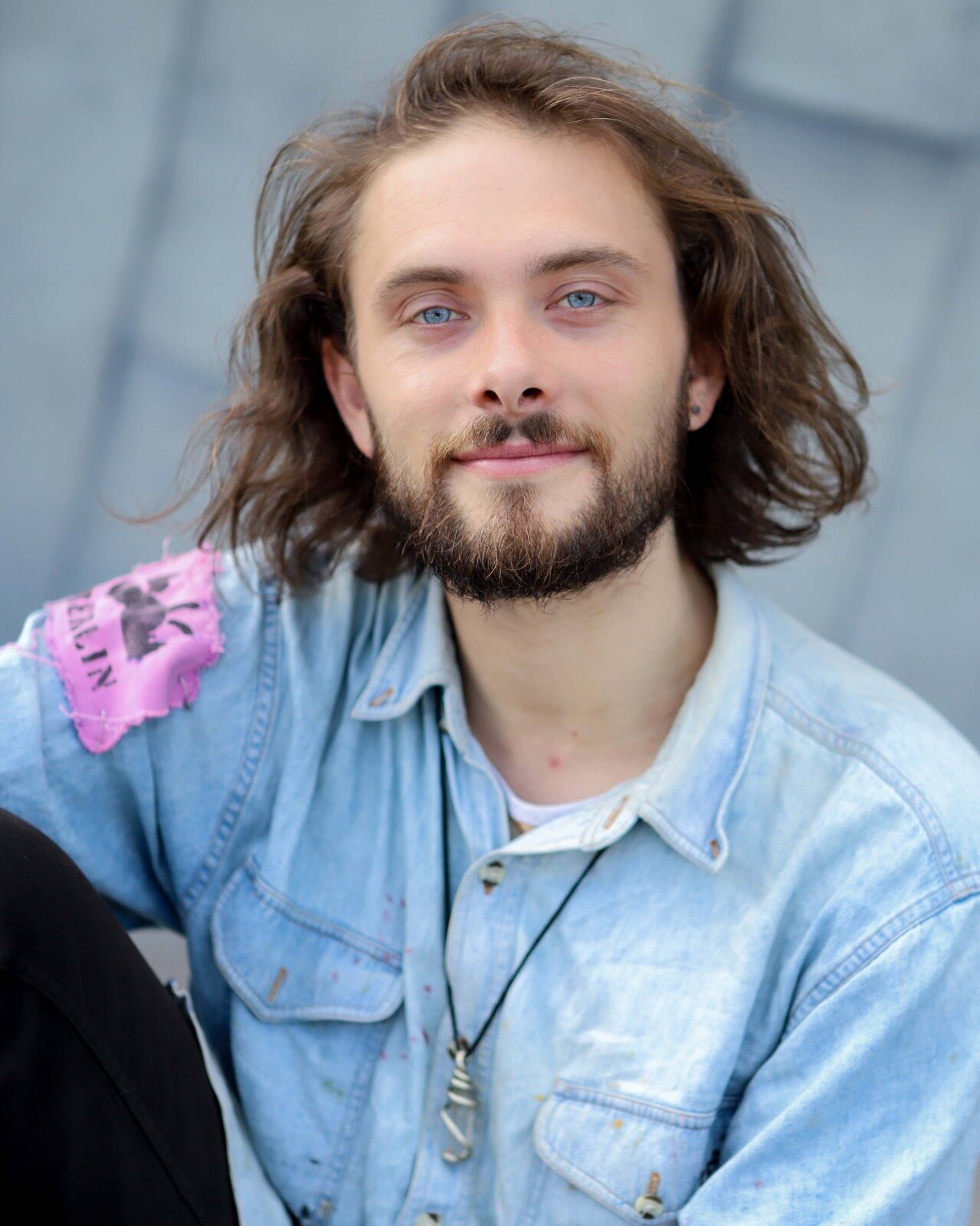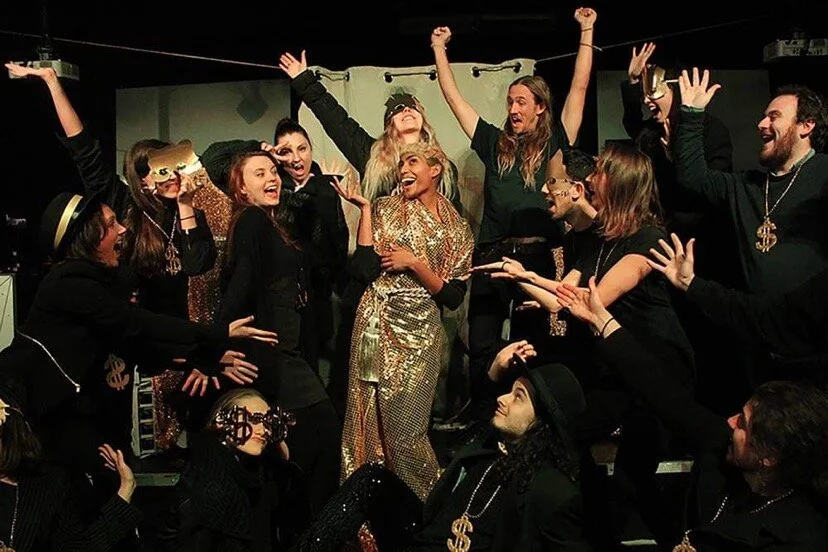We love diving into the profiles of all the exciting artists that we’re connected to here at Mrs C! This time, we sat down for a coffee in the beautiful sunshine with Harley Hefford (see left), an Australian artist who has just moved over to our side of the world, currently staying in Iceland.
Harley has worked in the arts from a young age and has done everything from acting, teaching, directing, painting, devising his own shows, scriptwriting, novel writing, poetry and facilitating festivals. He’s an all around creative with an impressive track record! He describes his central passion as an ‘event designer’, often putting together immersive shows and creative experiences.
Dip into our conversation where we gain an insight into how Harley’s practice has changed over the pandemic, as well as some top tips for staying creative and living an artistic life regardless of what you do.
“I always have some sort of vision of my life and art being very interconnected. I think this school in Iceland really shares that vision - the idea that having a daily creative practice feels deeply essential in an almost spiritual way. ”
So you’re here now! Definitely a surprising time to be making a trip from Melbourne. What inspired it?
I’m doing a few residencies over here in Europe. In particular going to LungA School in Iceland [www.lungaschool.is]. It seems like a fascinating arts school and they run a three-month long programme every season. Usually a group of 16 artists come together and do fairly self-led workshops with some structured classes but also a lot of time to create in the Icelandic wilderness. And I have a visual arts practice so I’m keen to have some space and time to paint in the middle of nowhere in Iceland. That’s one of my strongest reasons for coming over here. I always have some sort of vision of my life and art being very interconnected. I think this school in Iceland really shares that vision - the idea that having a daily creative practice feels deeply essential in an almost spiritual way.
“…when the rules of engagement are clear and safe, it’s empowering and exciting to be able to influence the performance as an audience member.”
Tell us more about interactive performance! What does it mean to you and how can we get involved?
I’m drawn to interactive performance as both a maker and an audience member. I love the feeling of the audience being ‘active.’ I find that when the rules of engagement are clear and safe, it’s empowering and exciting to be able to influence the performance as an audience member. It feels like a two-way dialogue and becomes more conducive to opening up conversations about a particular topic. It allows the audience to play, express themselves and discover in a less didactic way. Politically, I prefer the audience having this kind of control over their experience, rather than sitting passively to receive the ‘one true experience’ of the work.
To get involved, I think definitely try to see some interactive and participatory work, get a sense of what people are making. Live, if possible. Some big names to begin with are Punchdrunk and Meow Wolf in USA, but there’s more and more groundbreaking and experimental interactive work to discover wherever you are. Some fantastic online work as well - I’d recommend London-based Agency of Coney for some wonderful interactive theatre that’s playable from their website.
Can you tell us a bit more about your interactive work in Australia?
Before lockdown, I had a few projects going on at the time. In particular, I was helping out with a theatre festival that I have helped out with for the past few years, which is called 'The Town’. That happens a few hours away from Melbourne, Australia. It’s really fantastic and I think fairly original, I definitely haven't been to anything else quite like it.
The idea with ‘The Town’ is that it's basically a fake town. Different theatrical crews create formative versions of things you might find in a town, like, the supermarket or the post office or something. But each one has its own kind of wacky flavour. So maybe the postmen do a dance in formation or something and deliver insane letters to participants, things like that. There’s a lot of performance happening and the attendees are encouraged to choose a character to play for the weekend. There’s music and DJs and bands and things like that - but the theatricality really takes over and people take on all kinds of roles.
I would have been coordinating one of the spaces last year, a sort of interactive cafe where you could ‘order performances’ and I was pumped for that. I'd done a bit of planning and had a few rehearsals. And of course, the festival was cancelled. I'm quite good friends with Michael who organises that festival. And I think, especially for him, somebody who makes most of his living off planning live events, it’s really frustrating.
What kind of stuff did you do to stay creative to stay in touch with people?
Zoom calls and Zoom activities, which I imagine a lot of people in the world were doing! I started with a Saturday night weekly poetry group, and then a Sunday night short story club and then a yoga group. Before I knew it, I’d gotten a full weekly Zoom schedule.
I’d organised one or two things myself. I started one of the writing groups and I was also running some online games. So I was just experimenting a bit with game design, which I'm pretty interested in. I guess I had quite a captive audience as nobody had too much on! People were open minded and willing to give things a go. Even if I said, hey, I've just come up with a new game that I want to try - it was easy to wrangle 10 to 20 people to turn up on zoom!
“It was like there was less of a barrier towards the participation, than there might have been at a live show where people often feel a little more exposed.”
What kind of games are we talking here? Virtual games? Or like talking games?
Some were cooperative board games, I suppose. I would actually kind of make them PowerPoint slides, and just have all these little squares that I could move. And then I would screen-share and operate the pieces. The players would all be on the video call.
There was one game where everyone took on different animal characters, and all their identities were secret, and you were trying to figure out everyone else's identity. Each animal character had a special set of abilities that they could do. And when they used their special abilities, it gave you a clue as to what their animal might be, because you would kind of notice that they had managed to move ahead three spaces etc. And then you would think, okay, they must be one of the faster animals... things like that.
I collaborated on one game with a few friends where the participants were split into groups and the groups would challenge each other to perform particular tasks. That worked really well. It was like there was less of a barrier towards the participation, than there might have been at a live show where people often feel a little more exposed. Maybe something about the comfort of their own home as well. The challenges would be like - create a small boat out of whatever objects they had lying around that house. Or - everyone’s got five minutes, and you have to go and dress up as a fantasy character, like, you know, people can kind of think, “Oh, well, I own that weird green jumper that looks a bit like a cloak”. That was fun. We were running those each week, just for free, and for whoever wanted to come along.
What I think is really nice is that people from all over the world could participate. So sometimes my friends in Europe or America would drop in and that's kind of fun that they could be a part of this social event thats going on.
“Finding their own objectives and ways to “win”, deciding that they are in competition with another particular player or that they want to build the tallest possible tower. I think it’s awesome when people can create their own stories within the world.”
What do you feel the connections are between gaming and interactive performance?
Being in control of the story, and of your own experience. I was recently watching Will Wright (designer of The Sims) give a talk where he spoke of the narratives, missions and experiences people will create for themselves within the world - outside of the central premise. Finding their own objectives and ways to “win”, deciding that they are in competition with another particular player or that they want to build the tallest possible tower. I think it’s awesome when people can create their own stories within the world.
Are there any books that are currently inspiring you?
Maybe a couple! I’m reading ‘The Artist's Way’ by Julia Cameron at the moment, which I know you’re also a fan of, Francis. I also love this book which people might know a little less, it’s called ‘Free Play’ by Stephen Nachmanovitch. Similar to ‘The Artist’s Way’ in how it links creative freedom with spirituality, it encourages shedding this need for perfectionism, and just encourages the process. Stressing how important the process is and how good it is for people. A lot of chapters are based on different blocks people might have. Perfectionism being an example of a creative block. In saying ‘it has to be perfect’ you might stop yourself from even getting started. Each chapter offers useful ideas or thoughts that might help to get around those blocks. That’s been a really inspiring book for me.
“I’ve been trying to have a daily moment of being near nature, even if it is just a plant in the backyard and consciously appreciating that. I like ideas in Art Nouveau or movements like that where there’s direct inspiration from the plants, trying to design architecture with curved lines that mimic nature, really inspire me.”
Lastly, do you have any advice for people who are struggling to stay creative, possibly given the lack of stimulus considering the climate we’ve been in for the past year?
This might sound a bit random but I’ve been on a real journey of trying to connect back to nature and remember the majesty and splendor of the world around us. Whether it’s a beautiful forest or just this one tree that’s randomly growing in the middle of the city. I’ve been trying to have a daily moment of being near nature, even if it is just a plant in the backyard and consciously appreciating that. I like ideas in Art Nouveau or movements like that where there’s direct inspiration from the plants, trying to design architecture with curved lines that mimic nature, really inspire me. Even with my writing practice, my poetry, I’ve been trying to connect with this particular leaf or tree, and using that as inspiration for what I’m trying to write about.




